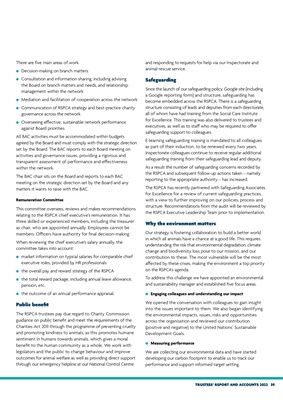
TRUSTEES' REPORT AND ACCOUNTS 2022 39
There are five main areas of work.
l Decision-making on branch matters
l Consultation and information sharing, including advising
the Board on branch matters and needs, and relationship
management within the network
l Mediation and facilitation of cooperation across the network
l Communication of RSPCA strategy and best-practice charity
governance across the network
l Overseeing effective, sustainable network performance
against Board priorities
All BAC activities must be accommodated within budgets
agreed by the Board and must comply with the strategic direction
set by the Board. The BAC reports to each Board meeting on
activities and governance issues, providing a rigorous and
transparent assessment of performance and effectiveness
within the network.
The BAC chair sits on the Board and reports to each BAC
meeting on the strategic direction set by the Board and any
matters it wants to raise with the BAC.
Remuneration Committee
This committee oversees, reviews and makes recommendations
relating to the RSPCA chief executive's remuneration. It has
three skilled or experienced members, including the treasurer
as chair, who are appointed annually. Employees cannot be
members. Officers have authority for final decision-making.
When reviewing the chief executive's salary annually, the
committee takes into account:
l market information on typical salaries for comparable chief
executive roles, provided by HR professionals
l the overall pay and reward strategy of the RSPCA
l the total reward package, including annual leave allowance,
pension, etc.
l the outcome of an annual performance appraisal.
Public benefit
The RSPCA trustees pay due regard to Charity Commission
guidance on public benefit and meet the requirements of the
Charities Act 2011 through the programme of preventing cruelty
and promoting kindness to animals, as this promotes humane
sentiment in humans towards animals, which gives a moral
benefit to the human community as a whole. We work with
legislators and the public to change behaviour and improve
outcomes for animal welfare as well as providing direct support
through our emergency helpline at our National Control Centre
and responding to requests for help via our Inspectorate and
animal rescue service.
Safeguarding
Since the launch of our safeguarding policy, Google site (including
a Google reporting form) and structure, safeguarding has
become embedded across the RSPCA. There is a safeguarding
structure consisting of leads and deputies from each directorate,
all of whom have had training from the Social Care Institute
for Excellence. This training was also delivered to trustees and
executives, as well as to staff who may be required to offer
safeguarding support to colleagues.
E-learning safeguarding training is mandated to all colleagues
as part of their induction, to be renewed every two years.
Inspectorate colleagues continue to receive regular additional
safeguarding training from their safeguarding lead and deputy.
As a result the number of safeguarding concerns recorded by
the RSPCA and subsequent follow-up actions taken - namely
reporting to the appropriate authority - has increased.
The RSPCA has recently partnered with Safeguarding Associates
for Excellence for a review of current safeguarding practices,
with a view to further improving on our policies, process and
structure. Recommendations from the audit will be reviewed by
the RSPCA Executive Leadership Team prior to implementation.
Why the environment matters
Our strategy is fostering collaboration to build a better world
in which all animals have a chance at a good life. This requires
understanding the risk that environmental degradation, climate
change and biodiversity loss pose to our mission, and our
contribution to these. The most vulnerable will be the most
affected by these crises, making the environment a top priority
on the RSPCA's agenda.
To address this challenge we have appointed an environmental
and sustainability manager and established five focus areas.
l Engaging colleagues and understanding our impact
We opened the conversation with colleagues to gain insight
into the issues important to them. We also began identifying
the environmental impacts, issues, risks and opportunities
across the organisation and reviewed our contribution
(positive and negative) to the United Nations' Sustainable
Development Goals.
l Measuring performance
We are collecting our environmental data and have started
developing our carbon footprint to enable us to track our
performance and support informed target setting.